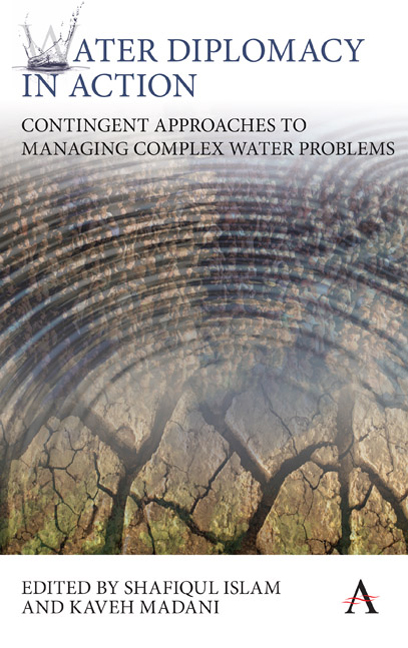Book contents
- Frontmatter
- Contents
- List of Figures
- List of Tables
- The Blind Men, the Elephant and the Well: A Parable for Complexity and Contingency
- Preface
- Part I ROOTS AND CAUSES OF COMPLEXITY AND CONTINGENCY IN WATER PROBLEMS
- Part II TOOLS, TECHNIQUES, MODELS AND ANALYSES TO RESOLVE COMPLEX WATER PROBLEMS
- Part III CASE STUDIES
- Chapter Ten The Nature of Enabling Conditions of Transboundary Water Management: Learning from the Negotiation of the Indus and Jordan Basin Treaties
- Chapter Eleven Mediation in the Israeli– Palestinian Water Conflict: A Practitioner's View
- Chapter Twelve Risk Distribution and the Adoption of Flexibility: Desalination Expansion in Qatar
- Chapter Thirteen The Grand Ethiopian Renaissance Dam: Conflict and Water Diplomacy in the Nile Basin
- Chapter Fourteen Engaging Stakeholders for Water Diplomacy: Lessons for Integrated Water Resources Management
- Chapter Fifteen Strategic Insights for California's Delta Conflict
- Notes on Contributors
- Index
Chapter Ten - The Nature of Enabling Conditions of Transboundary Water Management: Learning from the Negotiation of the Indus and Jordan Basin Treaties
from Part III - CASE STUDIES
Published online by Cambridge University Press: 10 January 2018
- Frontmatter
- Contents
- List of Figures
- List of Tables
- The Blind Men, the Elephant and the Well: A Parable for Complexity and Contingency
- Preface
- Part I ROOTS AND CAUSES OF COMPLEXITY AND CONTINGENCY IN WATER PROBLEMS
- Part II TOOLS, TECHNIQUES, MODELS AND ANALYSES TO RESOLVE COMPLEX WATER PROBLEMS
- Part III CASE STUDIES
- Chapter Ten The Nature of Enabling Conditions of Transboundary Water Management: Learning from the Negotiation of the Indus and Jordan Basin Treaties
- Chapter Eleven Mediation in the Israeli– Palestinian Water Conflict: A Practitioner's View
- Chapter Twelve Risk Distribution and the Adoption of Flexibility: Desalination Expansion in Qatar
- Chapter Thirteen The Grand Ethiopian Renaissance Dam: Conflict and Water Diplomacy in the Nile Basin
- Chapter Fourteen Engaging Stakeholders for Water Diplomacy: Lessons for Integrated Water Resources Management
- Chapter Fifteen Strategic Insights for California's Delta Conflict
- Notes on Contributors
- Index
Summary
Abstract
The complexity of transboundary water management lies in the dynamics of competition and cooperation that arise from the interactions and feedback among variables, processes, actors and institutions that share a basin or aquifer. The nature of complexity is, however, contingent on a variety of contextual characteristics of the interactions as well as the natural characteristics of the basin. Given the complexity of transboundary (hereafter TB) water management and its contingent manifestations, it is important to understand the means of interaction that can equitably explore and distribute the benefits of the basin for the riparians as well as keep its availability sustainable for posterity. Among different frameworks, mediated negotiation has shown resilience to initiate, affect and sustain interaction among riparians even when they remain hostile to each other on other issues. This chapter identifies three enabling conditions that make transboundary negotiation effective in managing complex and prolonged water disputes. In advancing the argument the chapter also makes the point that resiliency of these three enabling conditions rests on operationalizing the values of equity and sustainability in contextspecific ways. For empirical illustration of the efficacy of these enabling conditions, the chapter draws upon the case analyses of negotiation that led to the Indus Water Treaty between India and Pakistan and the 1994 peace treaty between Israel and Jordan.
Introduction: The Complexity of TransboundaryWater Management
Transboundary water management is complex because of the problems of water allocation in quantities, maintaining water quality and preserving the environment that spans many boundaries— political, social, jurisdictional, physical and ecological. Addressing this complex problem has remained a focal issue in the literature (Wolf 1999; Biswas 1992; Uitto and Duda 2002; Song and Whittington 2004; Dinar et al. 2007; Prescoli and Wolf 2010; Earle et al. 2010; Wolf 2010; Subramanian, Brown and Wolf 2012; Islam and Susskind 2013; Salman 2013; Dellapenna et al. 2013). The specific nature of the problem and, hence, the character of the disputes among the riparians will vary by basin context and the needs and capacities of the riparians. While scientific and engineering solutions are necessary to address the physical, chemical and ecological problems, organizational and political contexts are also integral to finding and sustaining adaptive solutions to disputes as they arise.
- Type
- Chapter
- Information
- Water Diplomacy in ActionContingent Approaches to Managing Complex Water Problems, pp. 181 - 202Publisher: Anthem PressPrint publication year: 2017



